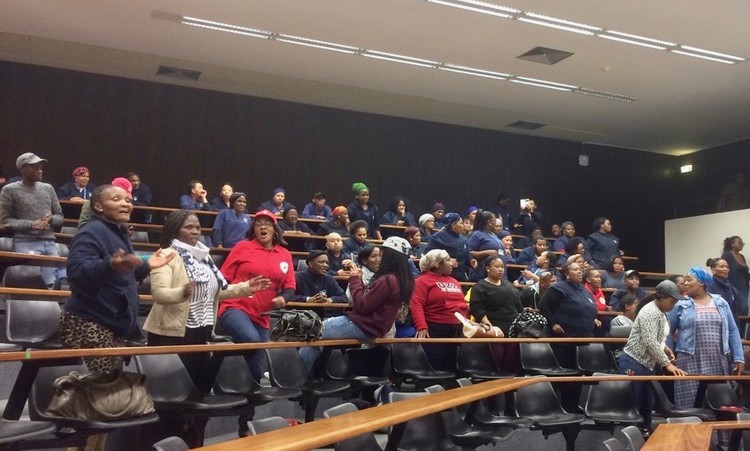
Over 150 workers at the University of Cape Town together with several student leaders met at the Leslie Social Science Building to discuss an agreement reached with the university. Photo: Laura Bratton
14 September 2017
On Thursday, over 150 workers at the University of Cape Town together with several student leaders met at the Leslie Social Science Building to discuss an agreement reached on Wednesday between UCT management and five trade unions.
Abraham Aghulas, organiser of the South African Liberated Public Sector Workers Union (Salipswu), addressed the group to explain the agreement.
The agreement ended a notification of strike action by Salipswu which was submitted to UCT over the weekend. It was Salipswu’s second notification of strike to UCT. The labour union was forced to withdraw its first notification of strike after UCT applied for an interdict saying that Salipswu was not specific enough about the time and place of its proposed strike.
Five trade unions were part of the negotiations: Salipswu, National Education Health and Allied Workers’ Union (NEHAWU), Democratised Transport Logistics and Allied Workers’ Union (DETAWU), University and Allied Workers Union (UAWU), and the UCT Employees Union (UCTEU).
The agreement established a “joint forum” and a task team with representatives from trade unions to continue discussions about issues related to workers brought onto the UCT payroll in 2016. It also created a work study to “assess reasonable staffing levels across operations,” said Vice Chancellor Max Price in a statement.
UCT agreed to give shift allowances for staff working night shifts, more pay for working Sundays and holidays, and a new shift pattern for residence catering starting 1 October 2017. The university committed to offering four-hour casual workers full-time positions starting 1 November 2017. It also agreed that pregnant women would no longer work night shifts.
The announcement was met with initial applause by UCT workers. There were however doubts about how the agreement would be implemented and some anger over past working conditions. “In the struggle to make workers feel comfortable at the university, this is just the beginning,” said student activist Masixole Mlandu.